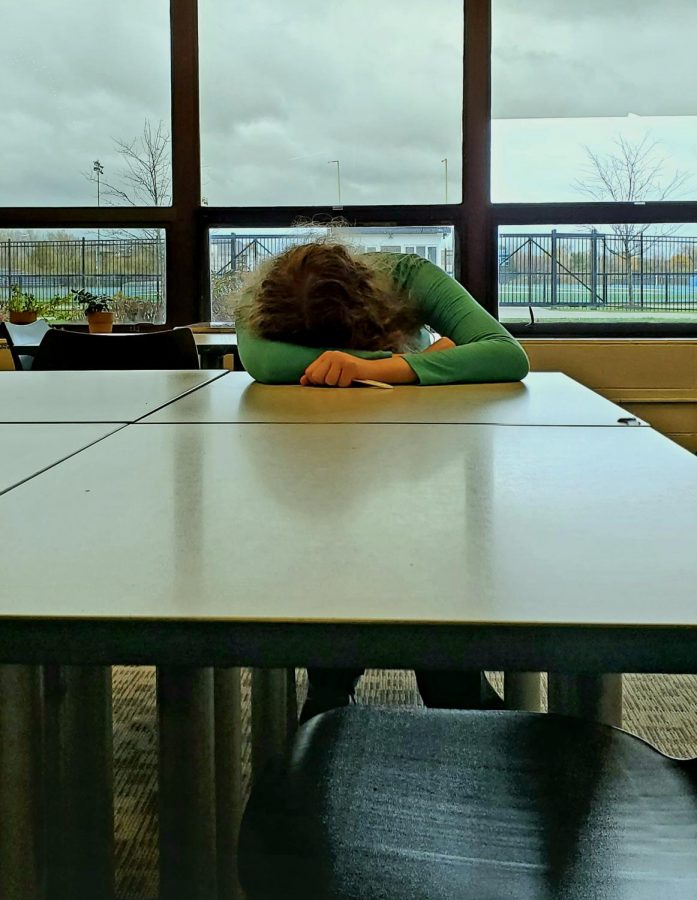“Sleeping” on sleep
Students prioritize school over sleep
Photo by Sasha Kek
About 43% of students say they sleep four to six hours, which is less than the eight to ten the National Sleep Foundation recommends for teenagers; however, the amount of school work students take home has an impact on how much they sleep. “I think teachers should talk to each other more, and I don’t think more than two tests should be allowed in one day,” Marin David, junior, who says she sleeps five to six hours on average, said. “That would be a dream, but that’s probably not going to happen. That definitely would help a lot of students.”
If statistics are to be trusted, the majority of the student body might need an intervention: 86% of students say they prioritize school over sleep, according to an October Bear Facts Student Media survey of 334, yet scientists at the National Sleep Foundation (NSF) says that teens need to be getting more sleep.
The NSF recommends teenagers get eight to ten hours of sleep per night. However, of the 334 respondents on the survey, 56% say they get seven to nine hours of sleep on average, falling below the recommended amount of sleep.
“On the days that I don’t get as much sleep, I’m not necessarily upset, but I have a different attitude. I’ll be more angry and a little bit more on edge, so on those days school is hard for me because I have trouble focusing and I’ll be sitting in class falling asleep; it’s just awful,” said Marin David, junior, who says she gets five to six hours of sleep. “Honestly, before these past two years, when people were like, ‘My eyes are closing in class,’ I was like, ‘You can just open them, it’s fine,’ but recently I’ve just been struggling to keep my eyes open and it was just awful.”
One of the reasons it is hard to stay awake, according to David, is due to “cramming” material into the curriculum, which results in more homework than previous years.
“I feel like before COVID, things were a little bit less stressful because all of the curriculums were spread out nicely, and now, because we missed so much school, I feel like teachers are cramming a lot because there are things we didn’t learn in past years that we should have,” David said. “There’s just a lot more work and a lot more stuff to understand and learn.”
Because the curriculum this year is more packed, David says students become sleep deprived, which results in a depressed mood, lowers immune responses, and increases the risk for obesity and high blood pressure, according to John Hopkins Medicine.
But it is not just school that makes students lose out on sleep, but busy schedules. For sophomore Husna Zakria, she sometimes has to sacrifice sleep to manage school and her baking business.
“School is definitely a huge priority in my life, and I want to be able to be successful in school,” Zakria said. “I don’t want to ever have to play catch-up when it comes to school work because that causes even more stress. I started my business about a year and a half ago, and it can definitely be hard to balance the two at times. There are always some instances where I am not able to go through with the order due to school, or sometimes I have to put school on the back burner if an order is taking longer than expected.”
David also has to balance her busy schedule because she is responsible for getting her younger siblings ready for school.
“I normally wake up around 6:00 am, which is kind of awful. I get ready in the morning and make sure all my homework is submitted, then I help get my siblings ready for school, and I have to make sure my sister’s awake so that we get out of the house on time,” David said. “The morning is a fun rush. I make them breakfast, and I make sure all of their backpacks are ready to go. I make sure they’re dressed because my mom is usually working and my dad is still asleep.”
But it is not just school and taking care of her siblings that take up David’s schedule.
“I teach karate, so sometimes I have to go straight from school to work because my shift starts at four. If I’m struggling in school, I call my boss – my boss’s very fun, forgiving person – and I let her know that I’m going to take a break,” David said. “I’ll focus more on school and getting my grades up if I need to, or if I have a big project, I’ll do that.”
And Zakria agrees that school, at times, must be the main priority no matter the cost for other occupations.
“I have found that you just have to prioritize your schedule and what you have to get done. If that means you have to make sacrifices and cut out one or two activities, or put less focus on something, then so be it,” Zakria said.
AP and Honors classes are top-priority for Zakria, and she says students because these classes are “more time-consuming, you have to be prepared for that.” But sometimes, she says, it is not just the class that affects students’ sleep schedules.
“I think some teachers do give out excessive homework, or some give out busy work instead of beneficial activities,” Zakria said. “Many classes have a system that includes note packets, videos, and lectures, with little to no interactive activities, and I think that is one aspect that should change. Students should be able to engage with what they are learning and interact with other classmates and do fun activities. For a lot of students, this helps them understand concepts better and faster, so there is less of a need for students to go home and stress out over concepts or spend hours trying to interpret them, lessening the amount of sleep they receive.”
It is not just teachers who should be conscious of students’ time, but students as well, according to David.
“I know a lot of people that have open periods and they’ll use it to go out and to get food, or to just have fun with friends. I’m not saying they shouldn’t do that because friends are fun, but if you know that you’re going to be busy after school, then try to knock out at least some of your work or go ask questions at that time,” David said. “I don’t have a study hall; my only free period I have is lunch because my schedule is so packed, so then I think teachers should start getting more in touch with students and making sure their workload is manageable, and be conscious of the other teachers giving work, too. A lot of people have three or four tests in one day and it’s just awful. I feel like teachers should talk to each other and create workload based on that.”

This is Sasha’s third and final year working with the Bear Facts staff as the LZ Life Editor. Aside from helping Bear Facts run smoothly, you can find...

